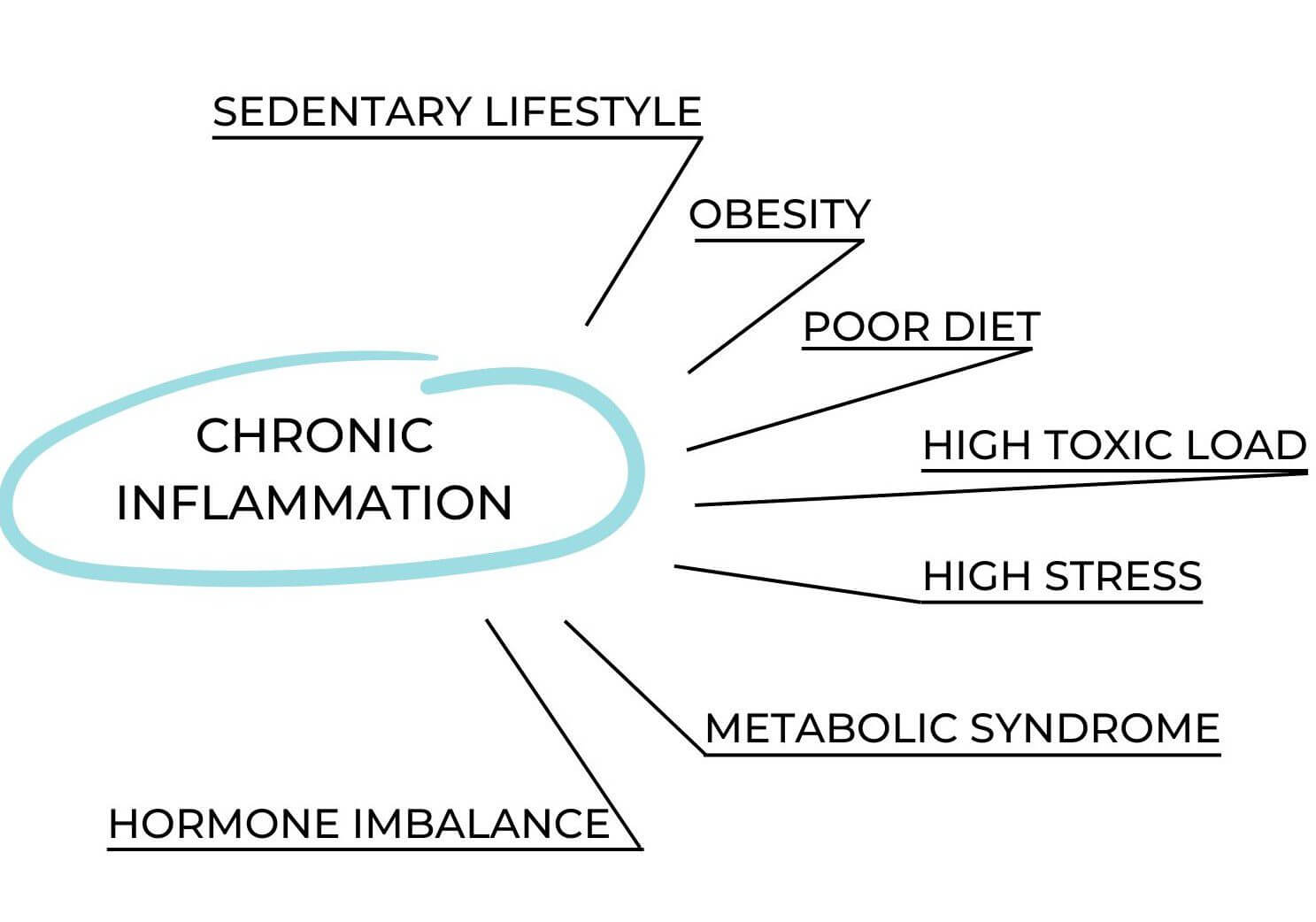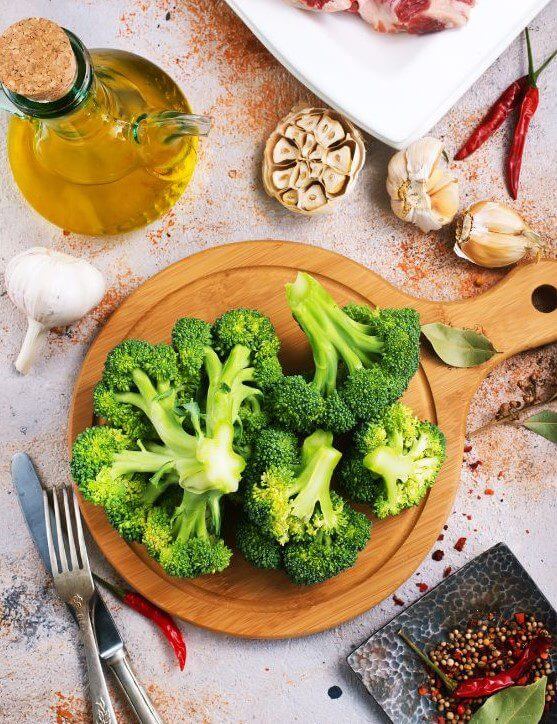The connection between chronic inflammation and breast cancer is well established, but unfortunately, many women don’t realize this is the case. What you might also not know is that you have significant control over how much inflammation builds up in your body. Too much, and you’re at risk for a slew of chronic diseases, including breast cancer. As I continue to work with breast cancer survivors, and women who want to do everything they can to prevent breast cancer, there are several patterns I see emerge with inflammation and the way we eat, sleep, rest, and move. I’ll share the advice I give to my patients to help prevent breast cancer, as well as simple methods anyone can use to reduce inflammation and its grip on your health.
Find the place to heal your cells and build your best self all under one digital roof inside the Superwoman Circle.
Inflammation drives breast cancer risk
A substantial amount of research shows a potential link between chronic inflammation and breast cancer (1). Studies show that chronic inflammation not only increases the risk of breast cancer development, but also a potential for spreading (metastasis), and recurrence.
Inflammation drives cancer risk by damaging DNA, activating certain genes involved in tumor development, inducing oxidative damage, and cell proliferation (2). All these mechanisms are gateways through which chronic inflammation might lead to cancer.
Read: 6 Secrets from Eastern Medicine for Better Immune Health
Where does inflammation come from? What causes inflammation?
 Inflammation is part of a normal immune response to infections or injury, and helps the immune system fight off unwanted intruders.
Inflammation is part of a normal immune response to infections or injury, and helps the immune system fight off unwanted intruders.
However, not all kinds of inflammation are helpful, and that’s where the problems start. Inflammation can turn chronic—instead of resolving—and an inflammatory response can spread throughout the body, triggering cellular damage over time. Because of this process, evidence suggests that the link between inflammation and breast cancer has a lot to do with the body’s immune response.
Chronic inflammation can result from infection, obesity, a sedentary lifestyle, and things like alcohol or tobacco use. This type of systemic, but “slow burning” inflammation lays the foundation for the development and proliferation of the types of cell that cause breast cancer.
Try these: 9 Easy Anti-Inflammatory Recipes
Inflammation may ‘turn on’ genes for breast cancer
Some women have a greater likelihood of developing cancer based on genetics, but this increased risk isn’t black and white. Only about 5 to 10% of all patients with breast cancer carry a hereditary predisposition (3). While genetics may arm the weapon, our environment and choices pull the trigger. In short, this means you have some degree of control over the likelihood of developing diseases you have a genetic predisposition to, such as breast cancer.
Some studies suggest that inflammation seems to “turn on” genes that promote cancer growth or prevent unhealthy cells from dying (a process called apoptosis) (4).
In one review, researchers outlined multiple studies which found that the women who had higher levels of inflammation were more likely to have changes in their genes that are linked with an increased risk of breast cancer (5).
Related: Balance Hormones to Reduce Breast Cancer Risk – Estrogen Dominance
What puts a woman at high risk for breast cancer?
Chronic inflammation can occur in response to lifestyle and environmental factors that are associated with breast cancer (6,7).
- Weight gain in adulthood and being overweight or obese after menopause
- Metabolic syndrome
- Insulin resistance
- High toxic load
- Dietary choices
There’s also strong evidence suggesting that stress is linked to increased cancer risk by inducing a chronic inflammatory state (9).
Watch: How to Reduce Breast Cancer Risk Naturally
How to reduce inflammation and breast cancer risk
Fortunately, there are many things you can do to reduce inflammation and decrease your risk of breast cancer. Here are some tips:
Your diet matters
What you eat makes a big difference in inflammation levels. A diet high in processed foods, sugar, and refined carbs can contribute to inflammation and increase your risk of breast cancer. While a healthy diet rich in fruits and vegetables, healthy fats, and quality proteins can help lower breast cancer risk.
Watch: Foods for Breast Cancer Prevention
Optimize estrogen detox
 Hormone imbalance increases the risk of breast cancer, and estrogen dominance is one of the most common hormonal imbalance conditions in women. Healthy estrogen metabolism is especially important for women who are in perimenopause, menopause, and beyond.
Hormone imbalance increases the risk of breast cancer, and estrogen dominance is one of the most common hormonal imbalance conditions in women. Healthy estrogen metabolism is especially important for women who are in perimenopause, menopause, and beyond.
To help your body properly detox estrogen, I recommend plenty of fiber intake, as this helps eliminate estrogen through regular bowel movements. Certain foods, such as broccoli, kale, and cauliflower contain special compounds called indole-3-carbinol, which helps break down estrogen in the gut. These methods help metabolize and eliminate excess estrogen before it has a chance to recirculate and cause harm to healthy cells.
Learn more: 6 Simple Steps to Hormone Detox in Your Gut & Liver
Reduce alcohol intake
I recommend my female patients limit alcohol to three servings per week or less. Ultimately, alcohol burdens the liver, and impairs nutrient absorption and detox—all of which triggers inflammation.
Enjoying a glass of wine or cocktail here and there is fine, but it’s important to find other ways to unwind if you normally have a drink (or two) nightly. I recommend my patients try other ways of relaxing, like 20 minutes of yoga in the evening. a soothing cup of golden milk, or a bath with epsom salts and Ylang ylang essential oil.
Detox from VOCs and endocrine disruptors
Some types of breast cancers are mediated by hormones (hormone receptor-positive or hormone-positive), but some are not (hormone-negative). To help prevent breast cancer that is not mediated by hormones, begin by removing harmful environmental toxins from your food, water, and home.
Phthalates, organophosphates, volatile organic compounds (VOCs) and more contribute to ever-increasing toxic burdens and the risk of chronic diseases.
I recommend first addressing diet, removing things like processed foods and meats, then moving on to the personal care products that could be high in endocrine disruptors. And last, address household cleaning products that are expelling harmful VOCs into the air.
Read: Simple Ways to Detoxify Your Home
Eat orange foods
Carotenoid-rich foods have been shown to help prevent breast cancer in some studies. Studies suggest that those with the highest levels of carotenoids in the blood have a 20% reduced risk of breast cancer (10).
In the fall, you can find tons of carotenoid-rich foods from orange veggies like pumpkin, carrots, sweet potatoes, and most kinds of winter squash. Dark, leafy greens are also in season and contain a boost of antioxidants as well as carotenoids.
Boost methylation
Methylation is a biochemical process that happens millions of times per second in every cell of your body. It’s responsible for everything from DNA repair to detoxification. When methylation is working properly, it helps protect us from disease. But when it’s not, we are at increased risk for chronic illnesses like cancer.
Several things regulate methylation, including genetics, lifestyle, and toxic load. Methylation also regulates how your body uses certain nutrients—B vitamins in particular. B vitamins play a key role in estrogen metabolism, so it’s important that methylation functions optimally. Inability to methylate can result in a build up of estrogen, or estrogen dominance, which may increase the risk of hormone-positive breast cancers.
Methylation capacity can be tested if you’re working with an integrative or functional medicine doctor. This will help you and your doctor establish a more thorough understanding of your unique hormone metabolism, detox, and nutrient status.
Exercise to oxygenate your cells
Cancer cells typically select low-oxygen environments. Exercise has been shown to decrease inflammation, improve immune function, and help with weight loss. It’s also one of the easiest ways to reduce chronic inflammation in every area throughout the body. Regular movement of any kind is perhaps the best thing you can do for your long-term cellular health.
Get your beauty sleep
Optimal sleep for cancer prevention is somewhere between 7 and 9 hours a night, 5 nights a week.
Inadequate sleep increases the risk of developing breast cancer (11). This is troublesome considering that the CDC declared sleep a “public health epidemic” with as many as 70 million Amerians struggling to get adequate rest.
Make stress management a priority
Extreme or chronic stress appears to activate breast cancer cells. There is a long-standing and well-studied link between stress and breast cancer, so much so that many women are newly diagnosed after a period of extreme stress.
While it’s not realistic to avoid stress, it is crucial to have habits in place to help your body and mind manage and recover from stress, whether it’s a one-time event or a chronic, daily stress.
Exercise, meditation, prayer and connection are all common ways of routinely managing stress. Additionally, scheduling at least a few hours per week of recovery from stress can help to keep stress hormones balanced. Try acupuncture, yoga, massage or tai chi as weekly stress solutions.
Read: The Integrative Guide to Stress Management from CentreSpringMD
Early detection and screening
- Remember to schedule your annual mammography (which detects lumps) and thermography (which measures inflammation).
- Ask your doctor about yearly hormone tests to track your own unique fluctuations.
- Stay on top of your monthly self-exams.
Reducing chronic inflammation should be a high priority on everyone’s list, but especially for women. The link between chronic inflammation and breast cancer is well established, but many women don’t realize they can control many of the lifestyle factors that are at play. A healthy diet, adequate sleep, proper hormone detox, and keeping stress in check can all help keep chronic inflammation to a minimum, and mediate the risk of developing many serious diseases, including breast cancer. So take care of yourself starting today – your future self will thank you!
Resources
- https://www.ncbi.nlm.nih.gov/pmc/articles/PMC7432395/
- https://pubmed.ncbi.nlm.nih.gov/22391222/
- https://www.cancer.org/cancer/types/breast-cancer/risk-and-prevention/breast-cancer-risk-factors-you-cannot-change.html
- https://pubmed.ncbi.nlm.nih.gov/19468060/
- https://www.ncbi.nlm.nih.gov/pmc/articles/PMC8345713/
- https://pubmed.ncbi.nlm.nih.gov/22429824/
- https://pubmed.ncbi.nlm.nih.gov/31824862/
- https://pubmed.ncbi.nlm.nih.gov/31004298/
- https://www.ncbi.nlm.nih.gov/pmc/articles/PMC5808262/
- https://www.ncbi.nlm.nih.gov/pmc/articles/PMC7948839/
- https://www.ncbi.nlm.nih.gov/pmc/articles/PMC8519507/



